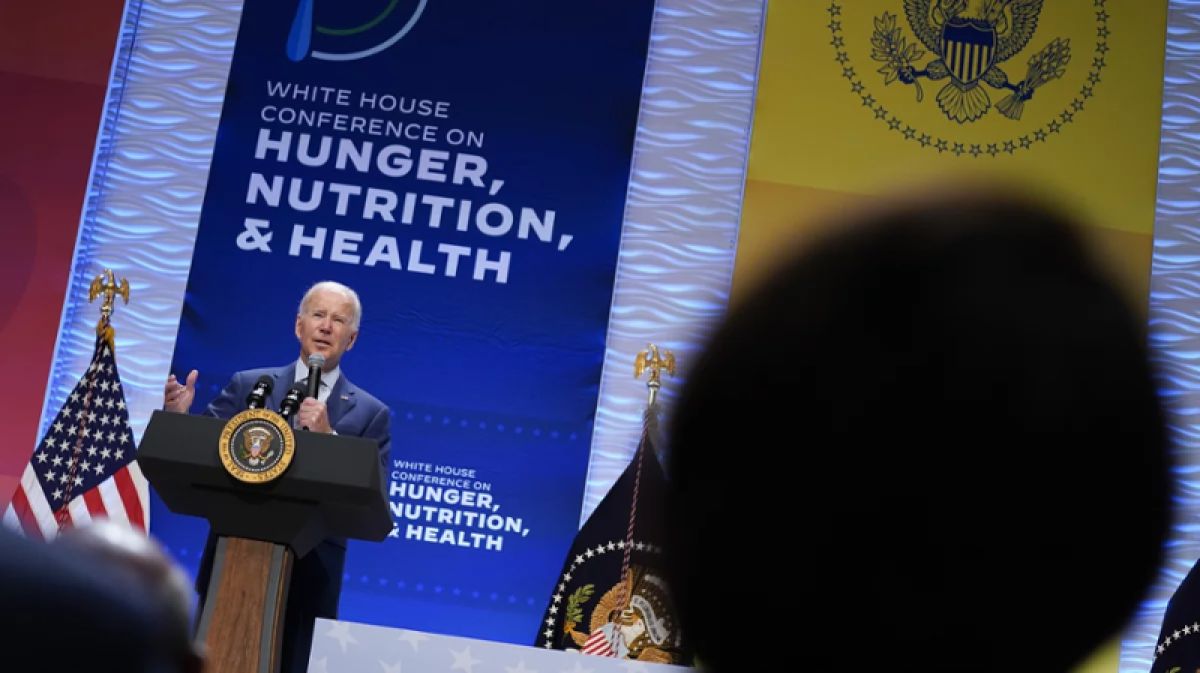
President Joe Biden speaks during the White House Conference on Hunger, Nutrition, and Health, at the Ronald Reagan Building in Washington, D.C., on Sept. 28, 2022. (Evan Vucci/AP)
President Biden pushed for Congress to permanently extend the child tax credit, raise the minimum wage and expand nutrition assistance programs to help reduce hunger rates as he opened the second-ever conference on food insecurity and diet-related diseases. But the administration faces a sharp uphill battle.
The conference came amid rising food inflation, the end of pandemic benefits that staved off hunger rates and storms on both coasts threatening the food security of millions. The event ties into one of Biden's goals: end hunger in America by 2030 through proposed legislation, regulatory changes and public-private partnerships.
The strategy put forward by the administration includes expanding nutrition assistance programs and launching more healthcare programs to cover medically tailored meals.
"If you look at your child and you can't feed your child, what the hell else matters?" Biden said.
"In America, no child should go to bed hungry. No parent should die of disease that can be prevented," he said.
His remarks focused on the pandemic, which brought food security and diet-related diseases to the forefront as families waited in long lines at foodbanks. And those with obesity, diabetes and hypertension and other forms of diet-related diseases have had an increased risk of hospitalization with COVID.
"So many of you were there to help your fellow Americans who lost their jobs, closed their businesses, faced eviction, homelessness, hunger, loss, control, maybe worst of all, lost hope and dignity," Biden said.
During the pandemic, major government assistance like stimulus checks and the child tax credit helped the country avert significant increases in food insecurity.
However, almost all pandemic benefits are coming to an end and advocates fear that food insecurity rates will increase this year.
The partisan split threatens the success
The White House's plan in part relies on Congress to pass new laws and it's unclear how quickly most of the ideas could become reality, since Republicans oppose many of the recommendations.
GOP Reps. Glenn "GT" Thompson of Pennsylvania and Virginia Foxx of North Carolina, the top Republicans on the committees that draft legislation related to food and nutrition, have raised concerns over the conference, calling it partisan.
Responding to the charge, Agriculture Secretary Tom Vilsack told reporters, "Well, there are 433 other members of the House. It's good to hear their views, I obviously disagree."
Sen. Mike Braun, R-Ind., the Senate GOP sponsor of legislation funding the conference, participated in a legislative panel at the start of the event. But he stayed away from discussing potential bills, focusing instead on private partnerships and his own experience as a business owner.
When asked about the partisan divides, Vilsack credited Sen. John Boozman, R-Ark., for helping to push through legislation that provided universal free meals over the summer and flexibilities to schools on what they can serve as they grapple with supply chain issues. Boozman's office said he not attend the event due to scheduling conflicts.
Health and Human Services Secretary Xavier Becerra also pushed back on the notion that the conference is partisan, noting the legislation funding the bill was bipartisan.













